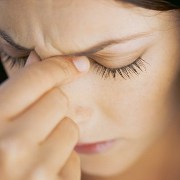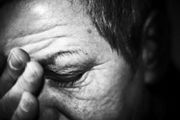 Photo: Getty Images
Photo: Getty Images
Headaches are a part of life just like the sun, water, wind, trees, cars, buses, computers, dry skin and stress are. Some of us suffer from headaches more frequently and severely than others but I have never met anyone who has never, not even once, suffered from a headache.
Over-the-counter non-steroidal anti-inflammatory medication can treat headaches but something as simple as taking a hot bath to relax and cool your muscles can also get the job done. A massage or simply resting can also be a good antidote.
Headache -- the searing pain behind one’s eyes in the head, neck or scalp -- is the bane of many people's existence. It can come on at the end of a long day of working hard, after being stuck in traffic, or in the middle of a noisy club or bar.
The most common type of headache is a tension headache and is the result of tight, clenched muscles. Overexerting your muscles or keeping your head in one position too long, sleeping on it in an uncomfortable position, or even grinding your teeth can result in a headache. These tend to occur on both sides of your head, not just one.
Other types of headaches can result from illnesses, including fevers. The serious conditions associated with headaches need immediate medical attention. The conditions include brain tumors, brain meningitis and strokes. Headaches associated with these conditions are much more rare.
Aside from tension headaches, the most common types of headaches are cluster headaches, sinus headaches and headaches associated with flu and fever.
Cluster headaches tend to happen many times each day over a period of months, are very painful and tend to disappear from one’s life as suddenly as they appeared.
Sinus headaches are related to your sinuses and their relative state of infection or health and will be felt in the front of the head. Premenstrual syndrome can also cause headaches.
Being older than 50 and having extreme pain in your head may be a sign of another medical condition.
As with any pain you experience, if it is too much to feel within the bounds of “normal” or “typical” for your body or if it comes seemingly out of nowhere, seek medical attention as quickly as you can.
Sources:
Headaches. The New York Times Health Guide. October 7, 2011
Retrieved from the internet on October 7, 2011
http://health.nytimes.com/health/guides/symptoms/headache/overview.html
Headaches. MedicineNet.com
Retrived from the internet on October 7, 2011
http://www.medicinenet.com/headache/article.html
Aimee Boyle is a regular contributor to EmpowHER
Reviewed October 10, 2011
by Michele Blacksberg RN
Edited by Malu Banuelos






Add a CommentComments
There are no comments yet. Be the first one and get the conversation started!